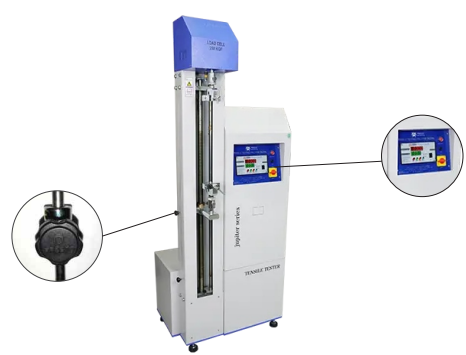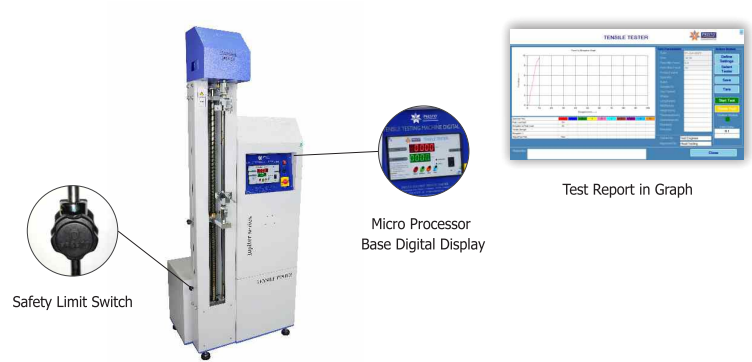- /
- Blog / Tensile Tester Applications in Plastics, Metals & Rubber
Tensile Tester Applications in Plastics, Metals & Rubber

In the current era of the fast paced engineering and manufacturing world, knowing how materials behave under stress is not just helpful—it is essential. Whether it is polymers, metals, or rubber, industries rely on Tensile Testing Machines to measure the strength, flexibility, and durability of materials. From quality control to product development, tensile testers provide accurate, repeatable data that helps manufacturers make better decisions.
In this blog: we will explore how tensile testers work and what a tensile test graph tells us, and how they are used in the plastic, metal, and rubber industries. We will also look at pricing factors and why Presto Group is a trusted name among tensile tester manufacturers.
Understanding the Tensile Testing Machine
A Tensile Tester is designed to pull a material sample until it breaks. It helps engineers measure important properties like tensile strength, elongation at break, yield point, and more.
With this data, companies can:-
- Choose the right material for a specific job
- Improve product safety and reliability
- Catch defects before materials go into production

No matter the industry, understanding a material’s behavior under tension is key to building strong and safe products.
Tensile Testing Machine Working Principle
The tensile testing machine's working principle is quite simple, yet powerful. The material is clamped between two grips–one stays still while the other moves and applies a pulling force. as the sample stretches, sensors measure the force applied and how much the material elongates.
This data is used to plot a tensile test graph, also known as a stress–strain curve. This graph reveals how the material performs under tension, showing details like:-
- Elastic limit
- Yield point
- Ultimate strength
- Break point
It's a valuable tool that help manufacturers predict how a material will behave in real-life situations.
Tensile Tester in the Plastic Industry
Plastic is used in everything from packaging and toys to car parts and medical equipments. Because plastics come in many forms, testing them is crucial to ensure safety and performance.
Key Applications:
- Plastic Film Testing→ Thin films used in packaging need to be strong enough to resist tearing during transportation
- Comparing Materials→ Tensile testers are used to evaluate different plastic blends and additives
- Product Innovation→ Engineers test prototypes to ensure new products can handle expected stresses
The tensile test graph for plastics often shows how stretchy and ductile they are. This helps in selecting the right material for flexible or rigid applications.
Tensile Tester in the Metal Industry
Metals are the backbone of construction, automotive, defense, and more. Understanding their mechanical strength is vital to ensure safety and durability.
Key Applications:
- Sheet and Bar Testing: Tensile testers measure how much load a metal part can handle before it bends or breaks
- Weld Joint Evaluation: Welded areas are tested to confirm they meet or exceed the parent metal’s strength
- Heat Treatment Validation: Post-process testing checks whether metals have been properly hardened or softened
Metals usually show a sharp yield point on the stress-strain curve, giving clear insight into when the material starts to deform permanently.
Tensile Tester in the Rubber Industry
Rubber is known for its stretchability, and it is used in seals, tires, footwear and industrial belts. But it needs to be tested to make sure it holds up over time.
Key Applications:
- Elasticity Testing→ Measure how much rubber can stretch and return to it's original shape
- Bond Strength→ In products like rubber-metal parts, the tensile test shows how strong the bond is
- Fatigue Resistance→ Rubber is tested under repeated stretching to predict how it will last in actual usage
A rubber tensile test graph usually has a long curve before it breaks, showing high elasticity and durability.
Factors Influencing Tensile Testing Machine Selection
When buying a universal tensile testing machine, a few things should be considered:
- Load Capacity→ Choose based on your material type—rubber requires less force than metals.
- Grips & Fixtures → Different materials need different grips to avoid slipping or damage.
- Speed Control → A good machine lets you control the pulling speed accurately.
- Software Integration - Modern systems include software for real–time graphs, data analysis, and auto-generated reports.
These features can make testing faster, more accurate, and easier to repeat.
Tensile Testing Machine Price Overview
The tensile testing machine price can range a lot depending on the specs. Some basic models for plastic films may start around Rs 70000, while high-end machines for metals or automation can cost Rs 70,000-5,00,000 lakh or even more.
Price depends on:
- Load range
- Automation level
- Software features
- Brand reputation
- Fixtures and accessories included
Don’t just go by price—look at accuracy, service support, and future upgrade options.
Why Choose Presto Tensile Testing Machine?
When it comes to tensile tester manufacturers, PrestoGroup is a name you can trust. They have been in the testing instrument industry for over 40 years and offer reliable, high performance machines tailored to industrial needs.
What Makes Presto Stand Out:
- Digital & computerized models
- High-accuracy sensors and load cells
- User-friendly interface and smart software
- ISO, ASTM-compliant systems
- Custom grips and fixtures based on your product
The Presto tensile testing machine is widely used by industries in packaging, plastic, automotive, and research labs.
Need help? Our team is just a call away.
Final Thoughts on the Role of Tensile Testers
No matter the material, tensile testing is crucial. It gives you real numbers you can trust, so your products don’t fail when it matters most. Whether you’re in plastics, metals, or rubber, a good tensile testing machine can save time, cut costs, and improve safety.
Presto Group has helped hundreds of companies improve their quality control systems with reliable testing solutions. We’d be happy to help you too.
Need a high-precision Tensile Tester? Call us now at +91 9210 903 903 or email info@prestogroup.com to get expert guidance and the best price from Presto Group – India’s trusted testing equipment manufacturer.
Recent Blogs
- Compression Testing Machine Operating Method & Packaging Strength Testing Applications
- Bottle Cap Torque Tester Digital Torque Testing for Packaging Quality Control
- Controlled Humidity Chamber: Environmental Testing Methods, Applications & Packaging Testing Use Cases
- Spectrophotometer & Portable Spectrophotometer: Working Principle and Laboratory Applications
- Paint Tester & Coating Testing Equipment: Types, Testing Process, and Industrial Applications



